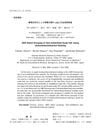 December 2011 in “Drug Research”
December 2011 in “Drug Research” The document shows the state of pharmaceutical patents as of 1999, focusing on treatments for various diseases.
 January 2010 in “Nihon Hou Kagaku Gijutsu Gakkaishi”
January 2010 in “Nihon Hou Kagaku Gijutsu Gakkaishi” The modified staining method can determine the ABO blood group of hair samples accurately.
 September 2009 in “Pediatric Dermatology”
September 2009 in “Pediatric Dermatology” UVB is good for a skin condition in Asian kids, a lotion works for head lice, a drug helps with a skin blistering disorder, a foam reduces itchiness in skin inflammation, birthmarks can be more widespread, and criteria for a neurocutaneous disorder were agreed upon.
35 citations,
April 1937 in “The journal of nutrition/The Journal of nutrition” Flavin prevents cataracts in young rats.
27 citations,
November 2007 in “Genomics” Mutations in specific keratin genes cause improper hair structure in mice due to faulty keratin protein assembly.
21 citations,
June 2009 in “Mammalian genome” A new mutation in the Hr gene causes hair loss in mice, similar to a human hair disorder.
 11 citations,
January 2013 in “International Journal of Trichology”
11 citations,
January 2013 in “International Journal of Trichology” A man got an allergic skin reaction from using superglue on a wig.
 2 citations,
January 2019 in “Biomedical Journal of Scientific and Technical Research”
2 citations,
January 2019 in “Biomedical Journal of Scientific and Technical Research” Saw palmetto in hair products might reduce hair loss but can cause side effects.
69 citations,
April 2010 in “Clinical ophthalmology” Bimatoprost is effective for growing longer, thicker, and darker eyelashes.
43 citations,
January 2016 in “Oxidative medicine and cellular longevity” THSG from a Chinese plant helps with aging and related diseases.
23 citations,
November 2018 in “International Journal of Molecular Sciences” Deoxyshikonin helps wounds heal faster in diabetic mice.
 18 citations,
January 2020 in “Frontiers in Chemistry”
18 citations,
January 2020 in “Frontiers in Chemistry” A new model can predict drug-disease links well, helping drug research.
16 citations,
December 2016 in “ecancermedicalscience” Hair analysis may help detect breast cancer early by identifying changes in lipid content.
 9 citations,
April 2019 in “Biomolecules & Therapeutics”
9 citations,
April 2019 in “Biomolecules & Therapeutics” Udenafil may help hair grow by activating certain stem cells.
 1 citations,
April 2024 in “Science Advances”
1 citations,
April 2024 in “Science Advances” Female cuckoo color differences are linked to their unique genes and help avoid male harassment.
1 citations,
December 2022 in “Pharmaceutics” Finasteride-loaded microemulsions can effectively enhance skin delivery for treating hair loss.
1 citations,
April 2022 in “Applied sciences” Bitter melon extract may help prevent hair loss and can be used in cosmetic products.
 January 2025 in “AAPS PharmSciTech”
January 2025 in “AAPS PharmSciTech” Transethosomes improve drug delivery through the skin and show promise for treating various conditions.
October 2024 in “Cosmetics” ATG effectively reduces hair frizz without damaging hair strength.
 January 2024 in “Molecules (Basel. Online)”
January 2024 in “Molecules (Basel. Online)” Juglone from walnut extracts may help repair damaged hair.
December 2023 in “Plants” Fissistigma oldhamii has compounds that help with pain, inflammation, and other health issues.
 December 2020 in “Daehanhanuihakoeji”
December 2020 in “Daehanhanuihakoeji” Rumex japonicas Houttuyn ethanol extract helps increase hair growth and protect against hair damage.

Ostrich antibodies can help restore hair growth in people with a specific type of hair loss, increasing hair count by 71% on average.
 15 citations,
July 1991 in “International Journal of Dermatology”
15 citations,
July 1991 in “International Journal of Dermatology” Laser Doppler velocimetry is a valuable noninvasive tool for skin blood flow research in dermatology.
 96 citations,
February 2007 in “The Journal of Clinical Endocrinology & Metabolism”
96 citations,
February 2007 in “The Journal of Clinical Endocrinology & Metabolism” Women with type 1 diabetes often have polycystic ovary syndrome and excess male hormones, which are frequently undiagnosed.
9 citations,
August 2021 in “International journal of molecular sciences” PPARγ is essential for maintaining healthy skin, controlling inflammation, and ensuring proper skin barrier function.
 20 citations,
December 2013 in “Journal of Dermatology”
20 citations,
December 2013 in “Journal of Dermatology” UV-B light increases inflammation-related substances in acne-related skin cells.
 19 citations,
January 2001 in “Dermatology + psychosomatics”
19 citations,
January 2001 in “Dermatology + psychosomatics” The review concluded that male pattern baldness is mostly seen negatively, affecting attractiveness and social appeal.
 14 citations,
February 2018 in “Psychoneuroendocrinology”
14 citations,
February 2018 in “Psychoneuroendocrinology” Mice lacking steroid 5α-reductase 2 show less aggression and better impulse control.
 4 citations,
December 2012 in “Human Biology”
4 citations,
December 2012 in “Human Biology” The most different genetic segment between Africans and East Asians is the EDA2R/AR region, with two main types influenced by population changes and natural selection, and linked to baldness.


















